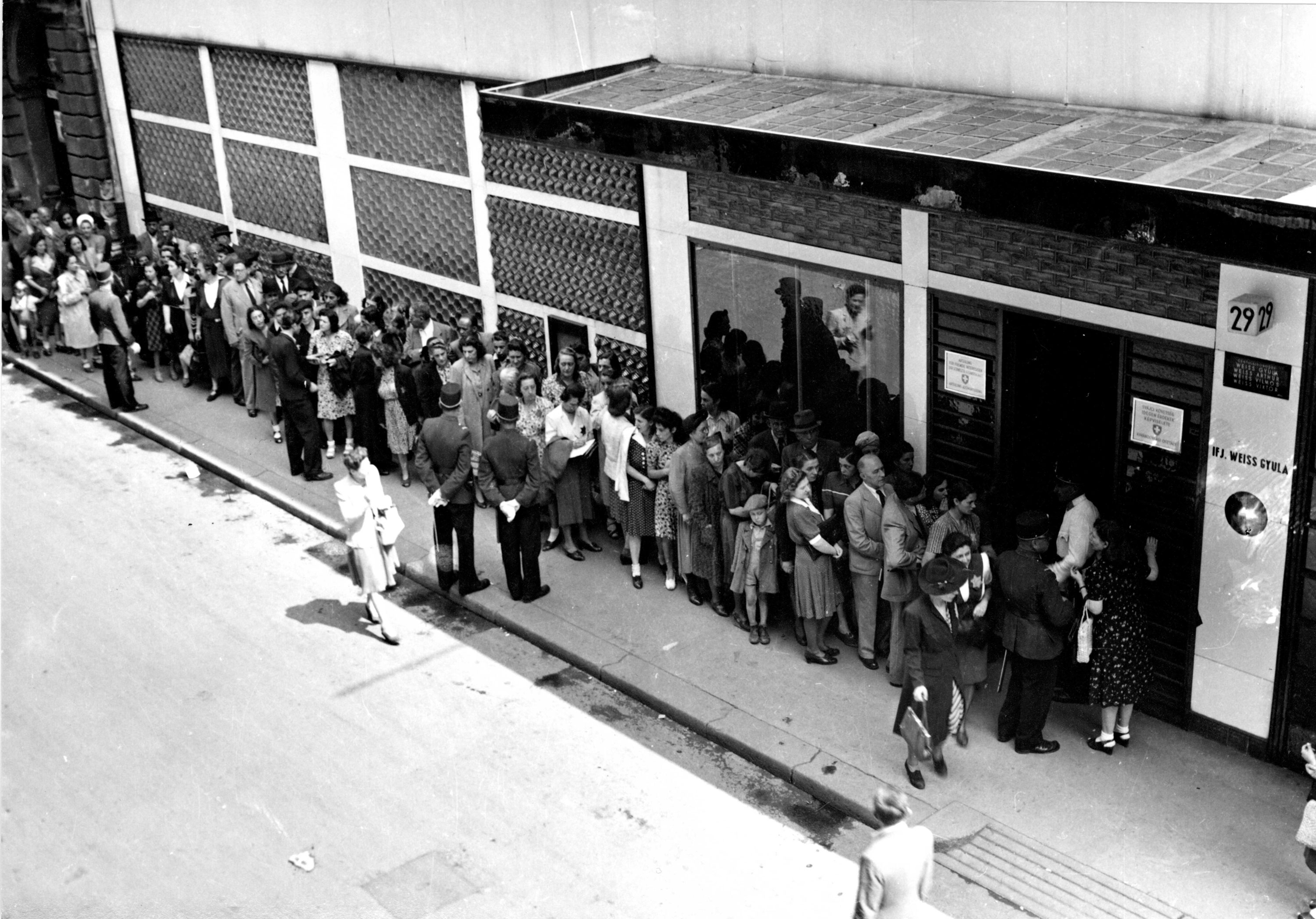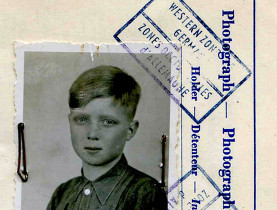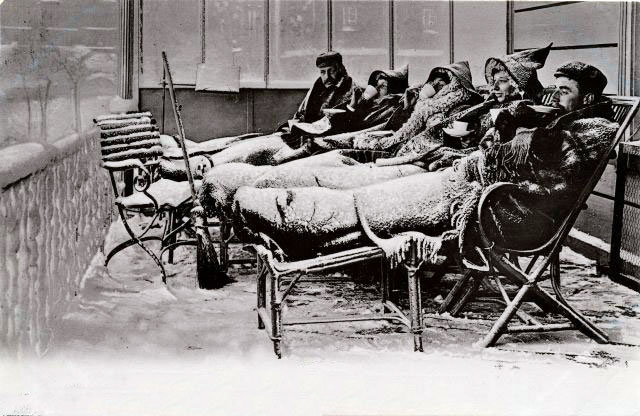Holocaust remembered in stories of rescuers

On Holocaust Remembrance Day people around the world commemorated the millions who were victims during the Nazi period.
To mark the sixty-fifth anniversary of the liberation of the Auschwitz-Birkenau concentration camp, swissinfo.ch reflects on a few of the many Swiss nationals who defied authority and provided hope to thousands of persecuted Jews and other refugees.
Yad Vashem, which is the Jewish people’s living memorial to the Holocaust, recognises more than 22,000 non-Jewish rescuers from 45 countries as “Righteous among the Nations”. Scores of Righteous come from Switzerland.
During the years of the Holocaust people throughout the world had to make moral choices. Some became perpetrators, others were bystanders.
A small group of Swiss individuals – including police commander Paul Grüninger, businessman Eduard Benedek Brunschweiler and diplomat Carl Lutz – chose to help the persecuted.
Thousands of lives were saved, because of the actions of these and other gentiles. For some it meant risking not only their own lives but the lives of their own family and children. Many paid with their lives.
None succeeded in halting the Holocaust but many Jews were enabled to survive as a result of their efforts.
The selfless businessman
One of the most recent rescuers to be honoured for helping Jews during the Nazi regime was Swiss businessman Eduard Benedek Brunschweiler, who had been working in Hungary during the war.
Last year Israel posthumously awarded Brunschweiler a medal and the privilege of having his name added to the Wall of Honour in the Garden of the Righteous at Yad Vashem in Jerusalem.
Brunschweiler was given the title for saving thousands of people, including around 30 Jewish children, when he took charge of the Pannonhalma Benedictine Abbey in central Hungary in October 1944 and kept it under Red Cross protection.
Speaking at the awards ceremony at the end of March last year in Pannonhalma Abbey, Israeli Ambassador to Hungary Aliza Bin Noun praised the Swiss national “for his courage in the darkest period of mankind’s history to rescue Jews’ lives here”.
According to Bin Noun, those awarded the title refused to turn against the persecuted or to compromise. “Benedek Brunschweiler had to have a deeply rooted feeling to overcome deadly threats, and be sure that his well prepared rescue operation was dedicated to meet God’s commandments and also his human commitment.”
A mere hundred kilometres away from Pannonhalma Abbey another heroic Swiss story was unfolding.
Visas for life
Carl Lutz was the Swiss Vice-Consul in Hungary’s capital from 1942 until the end of the Second World War. With the help of his wife, Gertrud, the Swiss diplomat rescued more than 60,000 Jews in Budapest from deportation to Nazi death camps.
The travelling exhibition, Carl Lutz and the Legendary Glass House in Budapest, clearly documents the dramatic events that led to this Swiss couple risking their careers and their lives to issue visas, citizenship papers and other forms of documentation that allowed Jews to escape the death camps.
Carl Lutz is credited with inventing the “Schutzbrief” (protective letter) which allowed thousands of Hungarian Jews to emigrate safely to Palestine.
He also established “safe houses” throughout Budapest by declaring them annexes of the Swiss legation and eventually extended diplomatic immunity to 72 buildings. The most famous one was an old industrial complex called the Glass House, where over 3,000 Jews reportedly sought protection from the Nazis. In 2005 it opened as a museum to honour the activities of Lutz.
In 1964, Lutz was the first Swiss citizen to be named “Righteous among the Nations. The Swiss government issued an official Carl Lutz memorial stamp, and a city street was also named in honour of him in his native town, Walzenhausen in 1969.
A moral dilemma
But it wasn’t just abroad where these courageous feats were taking place. In 1938, following Germany’s annexation of Austria, the Swiss government started imposing strict border controls on refugees from Germany and Austria in an attempt to appease Hitler.
This led to several hundred Swiss losing their jobs, facing hefty fines or even imprisonment for defying orders and secretly helping Jews and other refugees flee Nazi persecution. Best known is probably the case of Paul Grüninger, commander of police in St Gallen, who was forced to choose between the moral law and the law of the state.
Shortly after the annexation, Grüninger had received the order to slow down the wave of refugees crossing from the Austrian province of Vorarlberg and even to send them back. Realising their fate, the police commandant manipulated records and backdated passports to indicate any newly arrived refugees had entered Switzerland before the border had been closed.
More than 3,000 Austrian Jews are believed to have escaped via the St Gallen frontier patrol.
The following year, in April 1939, Grüninger was convicted of fraud and sentenced both to a prison sentence and to pay a fine.
His daughter, 88-year-old Ruth Roduner-Grüninger, described to swissinfo.ch how this act of altruism put an end to her father’s career and forced the family to live in abject poverty.
“We had to move out of our apartment and I had to give up school because we had no money,” she said. “We ended up in a room with no heating, no warm water and without a bathroom.”
However, despite this hardship Roduner-Grüninger says her father never felt any sadness, “He knew he had a clear conscience and a good heart.” she said.
“Despite everything I can’t remember my parents ever moaning or complaining about their situation and they always swore if history ever repeated itself, they would do exactly the same again today, as they did then.”
Andrew Littlejohn, swissinfo.ch
Swiss President Doris Leuthard has marked the 65th anniversary of the liberation of Auschwitz saying the principles of humanity and respect should never be forgotten.
Leuthard added that Switzerland supported the preservation of the Nazi death camp as a memorial.
“Nazi barbarism left behind distress, despair, a devastated country and millions of innocent victims,” she said.
Israeli Prime Minister Benjamin Netanyahu, Polish President Lech Kaczynski and ministers from many European countries are due to attend commemorative events at Auschwitz on Wednesday.
Holocaust Remembrance Day is commemorated internationally on January 27 each year. This date was chosen as it coincides with the anniversary of the liberation of the Auschwitz concentration camp, on January 27, 1945.
The full name of the day commemorating the victims of the Holocaust is Yom Hashoah Ve-Hagevurah— literally the Day of (remembrance of) the Holocaust and the Heroism.
It is marked by Jewish communities on the 27th day in the month of Nisan – a week after the seventh day of Passover, and a week before Yom Hazikaron (Memorial Day for Israel’s fallen soldiers). It marks the anniversary of the Warsaw Ghetto uprising. This year, Yom Hashoah will be on April 12.
Israel’s Medal of the Righteous, which was created in 1953 by the Yad Vashem Institute, Israel’s Holocaust memorial, was set up to honour non-Jews who risked their own lives to save Jews from the Nazis.
The award is the only one that the State of Israel hands over to non-Jewish persons. The concept of the term originates from “righteous gentiles”, a phrase used to refer to non-Jews who abide by the Seven Laws of Noah. These are a set of seven moral principles that, according to the Talmud, were given by God to Noah as a binding set of laws for all mankind.
Until the mid 1990s many “Righteous among the Nations” planted trees to commemorate their acts. In 1996 a special memorial garden was founded that includes the names of all the recipients of the award and to which recipients’ names are added as the people are accorded recognition.

In compliance with the JTI standards
More: SWI swissinfo.ch certified by the Journalism Trust Initiative













You can find an overview of ongoing debates with our journalists here . Please join us!
If you want to start a conversation about a topic raised in this article or want to report factual errors, email us at english@swissinfo.ch.